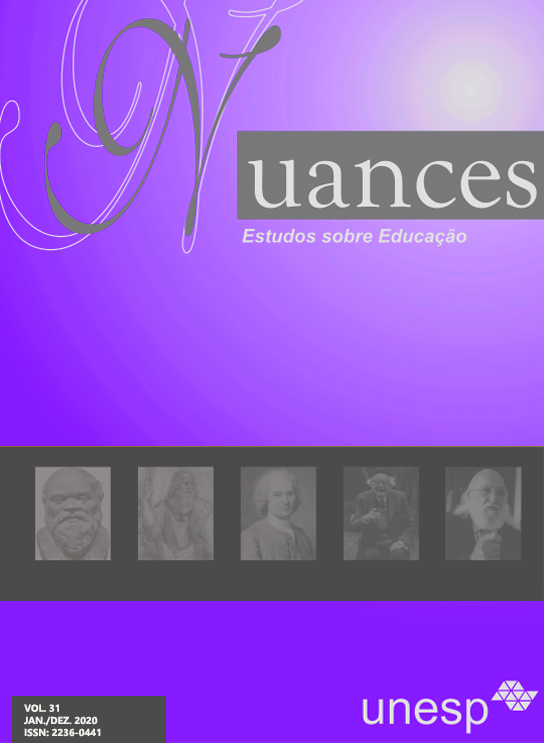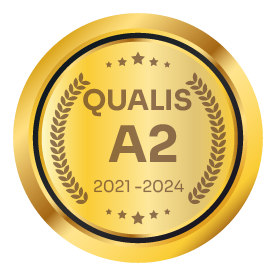Alfabetização digital de professores universitários orientada para novas tecnologias
DOI:
https://doi.org/10.32930/nuances.v31i0.8332Palavras-chave:
literacia digital, competências digitais, tecnologia digital, ensino universitárioResumo
As mudanças radicais pelas quais a humanidade está passando deram lugar a transformações, entre as quais se destaca o ensino de nível superior, e neste aspecto é necessário contemplar a diversidade de situações próprias da alfabetização digital. Este aspecto é o que catalisa o desenvolvimento deste trabalho em que se dão a conhecer os diversos posicionamentos e expectativas em relação à literacia digital na perspetiva das novas tecnologias de forma a dar um panorama mais consistente em relação às constantes mudanças. que continuam a evoluir e que apontam inexoravelmente para a sugestão inelutável de mudanças de cargos no ensino superior, aspecto que, pelas suas nuances, conjuga uma série de aspectos que este trabalho dá a conhecer.Downloads
Referências
AENI A., HANIFAH N., SUNAENGSIH, C. The impact of the internet technology on teacher competence and student morality. Journal of Physics: Conference Series, n. 1318, 2019. doi:10.1088/1742-6596/1318/1/012046
ALT D. Science teachers' conceptions of teaching and learning, ICT efficacy, ICT professional development and ICT practices enacted in their classrooms. Teaching and Teacher Education, vol. 73, 2018, pp. 141-150. https://doi.org/10.1016/j.tate. 2018.03.020
BHATT I., MACKENZIE A. Just Google it! Digital literacy and the epistemology of ignorance. Teaching in Higher Education, vol. 24, n. 3, 2019, pp. 302-317. https://doi.org/10.1080/13562517.2018.1547276
BLAYONE T., MYKHAILENKO O., VAN OOSTVEEN R., GREBESHKOV O., HREBESHKOVA O., VOSTRYAKOV O. Surveying digital competencies of university students and professors in Ukraine for fully online collaborative learning. Technology, Pedagogy and Education, 2017, pp. 1-18. doi: 10.1080/1475939x.2017.1391871
BUDARINA A., POLUPAN K. Digital quality management in higher education. Higher Education in Russia, vol. 28, n. 4, 2019, pp. 93-97. doi: 10.31992/0869-3617-2019-28-4-93-97
CABERO J., ROMERO R., BARROSO J., PALACIOS A. Marcos de competencias digitales docentes y su adecuación al profesorado universitario y no universitario. Revista Caribeña de Investigación Educativa (RECIE), 4(2), 2020, pp. 137-158. https://doi.org/10.32541/recie.2020.v4i2.pp137-158
CAMPBELL E., KAPP R. Developing an integrated, situated model for digital literacy in pre-service teacher education. Journal of Education (University of KwaZulu-Natal), vol. 79, 2020, pp. 18-30. http://dx.doi.org/10.17159/2520-9868/i79a02
CHMURA M., MALACH J., VICHERKOVÁ D. (2019). The significance of digital competences of university teachers: the views of the teachers and students themselves. In: 17th International Conference e-Society, 2019, pp. 131-142. ISBN: 978-989-8533-85-2
COPPARI N., BAGNOLI L. Alfabetización Digital de Docentes: Análisis Teórico y Propuesta de Evaluación Piloto. Revista de Investigación Científica en Psicología, vol. 17, n. 1, 2020, pp. 112-140. https://bit.ly/2V9iUaL
COTE T., MILLINER B. A Survey of efl teachers’ digital literacy: a report from a japanese university. Teaching English with Technology, vol. 18 n. 4, 2018, pp. 71-89. https://bit.ly/2Ji5uGZ
DE SOUSA C., PESSOA T., ARRUFAT M. Alfabetización y competencia digital en Educación Superior: una revisión sistemática. REDU: Revista de Docencia Universitaria, vol. 17, n. 1, 2019, pp. 1-11. https://bit.ly/37eY4fz
DIAZ Y., CRUZ M., PÉREZ M. Instrumento para caracterizar la alfabetización digital de los docentes universitarios cubanos. En: XVIII Congreso Internacional de Informática en la Educación “INFOREDU 2020”. https://bit.ly/36MkZ1K
DURÁN E., OZEN N. Turkce Derslerinde Dijital Okuryazarlik. Turkiye Egitim Journal, vol. 3, n. 2, 2018, pp. 31-46. doi: 11..11111/ted.xx
DURRIYAH T., ZUHDI M. Digital literacy with EFL student teachers: Exploring Indonesian student teachers’ initial perception about integrating digital technologies into a teaching unit. International Journal of Education and Literacy Studies, vol. 6, n. 3, 2018, pp. 53-60. http://dx.doi.org/10.7575/aiac.ijels.v.6n.3p.53
ERYANSYAH E., ERLINA E., FIFTINOVA F., NURWENI A. (2019). EFL Students' Needs of Digital Literacy to Meet the Demands of 21stCentury Skills. Indonesian Research Journal in Education (IRJE), 2019, pp. 442-460. https://doi.org/10.22437/irje.v3i2.8297
FALLOON G. (2020). From digital literacy to digital competence: the teacher digital competency (TDC) framework. Educational Technology Research and Development, vol. 68, 2020, pp. 2449-2472. https://doi.org/10.1007/s11423-020-09767-4
FERNÁNDEZ E., LEIVA J., LÓPEZ E. (2018). Competencias digitales en docentes de Educación Superior. Revista digital de investigación en docencia universitaria, 12(1), 213-231. http://dx.doi.org/10.19083/ridu.12.558
GARCÍA D., VILLARREAL J., ORTEGA J., CUELLAR Ó., HENAO C. 2020. Dimensiones de competencia digital en docentes universitarios: análisis relacional basado en componentes. Revista Ibérica de Sistemas e Tecnologias de Informação, n. E28, 2020, pp. 945-960. https://bit.ly/39Ezg3v
GNAWALI L. (2020). Embedding digital literacy in the classroom. In: Developing effective learning in Nepal: Insights into school leadership, teaching methods and curriculum. 2020, Edited by: Chris Tweedale and Jess Staufenberg. British Council.
GONZÁLEZ F., TARANGO J., FIERRO L. Identificación de capacidades digitales en estudiantes y docentes universitarios del área de humanidades. Cuadernos de documentación multimedia, vol. 29, 2018, pp. 54-78. http://dx.doi.org/10.5209/CDMU.60542
GUAYARA C., MILLÁN E., GÓMEZ C. Diseño de un curso virtual de alfabetización digital para docentes de la Universidad de la Amazonia. Revista Científica, vol. 34, n. 1, 2019, pp. 34-48. https://doi.org/10.14483/23448350.13314
HÄMÄLÄINEN R., DE WEVER B., NISSINEN K., CINCINNATO S. What makes the difference–PIAAC as a resource for understanding the problem-solving skills of Europe's higher-education adults. Computers & Education, vol. 129, 2019, pp. 27-36. doi: 10.1016/j.compedu.2018.10.013
HEINONEN K., JÄÄSKELÄ P., HÄKKINEN P., ISOMÄKI H., HÄMÄLÄINEN R. University Teachers as Developers of Technology-Enhanced Teaching-Do Beliefs Matter? Journal of Research on Technology in Education, vol. 51, n. 2, 2019, pp. 135-151. https://doi.org/10.1080/15391523.2018.1564894
HOBBS R., COIRO J. Design features of a professional development program in digital literacy. Journal of Adolescent & Adult Literacy, vol. 62, n. 4, 2019, pp. 401-409. https://doi.org/10.1002/jaal.907
ILINA I., GRIGORYEVA Z., KOKOREV A., IBRAYEVA L., BIZHANOVA K. Digital literacy of the teacher as a basis for the creation of a unified information educational space. International Journal of Civil Engineering and Technology (IJCIET), vol. 10, n. 1, 2019, pp. 1686-1693. https://bit.ly/3o3HVk8
JIMÉNEZ K., MIGUEL V., FERNÁNDEZ M., DIAZ K. Percepción de competencias digitales en docentes universitarios en formación. Revista Venezolana de investigación educativa, vol. 1, n. 1, 2017, pp. 1-21. https://bit.ly/2UIwxNP
KURNIAWATI N., MAOLIDA E., ANJANIPUTRA A. The praxis of digital literacy in the EFL classroom: Digital-immigrant vs digital-native teacher. Indonesian Journal of Applied Linguistics, vol. 8, n. 1, 2018, pp. 28-37. https://bit.ly/35MPPrW
KVON G., VAKS V., KALIMULLIN A., BAYANOVA A., SHAIDULLINA A., DOLZHIKOVA A., LAPIDUS N. Developing the Informational and Digital Environment of a University: Problem Analysis and Assessment. Eurasia Journal of Mathematics, Science and Technology Education, vol. 15, n. 10, 2019, pp. 1-14. doi:10.29333/ejmste/109503
LAU J., BONILLA J., GÁRATE A. Artificial Intelligence and Labor: Media and Information Competencies Opportunities for Higher Education. Information Literacy in Everyday Life, 2019, pp. 619-628. doi: 10.1007/978-3-030-13472-3_58
LÉVANO L., SÁNCHEZ S., GUILLÉN P., TELLO S., HERRERA N., COLLANTES Z. Competencias digitales y educación. Propósitos y Representaciones, vol. 7, n. 2, 2019, pp. 569-588. http://dx.doi.org/10.20511/pyr2019.v7n2.329
LIST A. Defining digital literacy development: An examination of pre-service teachers’ beliefs. Computers & Education, vol. 138, 2019, pp. 146-158. https://doi.org/10.1016/j.compedu.2019.03.009
LIST A., BRANTE, E., KLEE H. A framework of pre-service teachers’ conceptions about digital literacy: Comparing the United States and Sweden. Computers & Education, vol. 148, 2020, pp. 1-20. https://doi.org/10.1016/j.compedu.2019.103788
LIU Z., TRETYAKOVA N., FEDOROV V., KHARAKHORDINA M. Digital Literacy and Digital Didactics as the Basis for New Learning Models Development. International Journal of Emerging Technologies in Learning, vol. 15, n. 14, 2020, pp. 1-15. https://doi.org/10.3991/ijet.v15i14.14669
LÓPEZ J., POSO S., MORALES M., LÓPEZ E. Competencia digital de futuros docentes para efectuar un proceso de enseñanza y aprendizaje mediante realidad virtual. Edutec. Revista Electrónica De Tecnología Educativa, n. 67, 2019, pp. 1-15. https://doi.org/10.21556/edutec.2019.67.1327
MARCI G., VOGEL T. Digital literacy and inclusion: The impact of theory and practice in teachers’ education. INTED2018 Proceedings. Valencia: IATED Academy, 2018, pp. 6872-6879. https://bit.ly/35JKHVo
MERCADER C., GAIRÍN J. University teachers' perception of barriers to the use of digital technologies: the importance of the academic discipline. International Journal of Educational Technology in Higher Education, vol. 17, n. 1, 2020, pp. 1-14. https://doi.org/10.1186/s41239-020-0182-x
OCAÑA Y., VALENZUELA L., MORY W., GALLARDAY S. Digital Skills and Digital Literacy: New Trends in Vocational Training. International Journal of Early Childhood Special Education (INT-JECSE), vol. 12, n. 1, 2020, pp. 370-377. doi: 10.9756/INT-JECSE/V12I1.201016
PALLADINO V., GUARDADO M. Extending the heritage language classroom: experiences of digital technology use in two community schools in Alberta, Canada. Language, Culture and Curriculum, vol. 31, n. 2, 2017, pp. 150-167. doi: 10.1080/07908318.2017.1415923
PÉREZ K., MARTÍNEZ R., PATIÑO I. Alfabetización Digital: El uso de las TIC’s en el desempeño docente de profesores universitarios. Vincula Tética, vol. 4, n. 1, 2018, pp. 14-20. https://bit.ly/3fjL7VI
PHOENIX T., TRANG H. The digital imperative in the 21st century classroom: Rethinking the teacher-learner dynamic. Issues in Teacher Education, vol. 28, n. 1, 2019, pp. 80-98. https://bit.ly/3q6U0H3
POLIZZI G. Digital literacy and the national curriculum for England: Learning from how the experts engage with and evaluate online content. Computers & Education, n. 152, 2020, pp. 1-15. https://doi.org/10.1016/j.compedu.2020.103859
REIS C., PESSOA T., GALLEGO M. Alfabetización y competencia digital en Educación Superior: una revisión sistemática. REDU. Revista de Docencia Universitaria, vol. 17, n. 1, 2019, pp. 45-58. https://doi.org/10.4995/redu.2019.11274
RIVAS B., GÉRTRUDIX F., DE CISNEROS J. La percepción del docente universitario ante el uso y valor de los datos abiertos. Educacion XX1, vol. 22, n. 2, 2019, pp. 141-163. doi: 10.5944/educXX1.21317
RIZAL R., SETIAWAN W., RUSDIANA, D. Digital literacy of preservice science teacher. Journal of Physics, vol. 1157, n. 2, 2019, pp. 1-6. doi:10.1088/1742-6596/1157/2/022058.
SPANTE M., SOFKOVA S., LUNDIN M., ALGERS A. Digital competence and digital literacy in higher education research: Systematic review of concept use. Cogent Education, vol. 5, n. 1, 2018, pp. 1-21. doi:10.1080/2331186x.2018.1519143
SPIRES H. Critical perspectives on digital literacies: Creating a path forward. Media and Communication, vol. 7, n. 2, 2018, pp. 1-3. http://dx.doi.org/10.17645/mac.v7i2.2209
TOMCZYK Ł. Skills in the area of digital safety as a key component of digital literacy among teachers. Education and Information Technologies, vol. 25, n. 1, 2020, pp. 471-486. https://doi.org/10.1007/s10639-019-09980-6
VALENZUELA L., COLLANTES Z., DURAND E. Sobre la gobernanza digital, política digital y educación. Revista Eleuthera, vol. 22, n. 2, 2020, pp. 88-103. doi: 10.17151/eleu.2020.22.2.6
WATT D. Video production in elementary teacher education as a critical digital literacy practice. Media and Communication, vol. 7, n. 2, 2019, pp. 82-99. http://dx.doi.org/10.17645/mac.v7i2.1967.
YILDIZ E. Opinions of Academicians on Digital Literacy: A Phenomenology Study. Cypriot Journal of Educational Sciences, vol. 15, n. 3, 2020, pp. 469-478. doi: 10.18844/cjes.v%vi%i.4913
ZÁHOREC J., HAŠKOVÁ A., MUNK M. Teachers' Professional Digital Literacy Skills and Their Upgrade. European Journal of Contemporary Education, vol. 8, n. 2, 2019, pp. 378-393. https://bit.ly/36KpvO4.
Downloads
Publicado
Edição
Seção
Licença
Atribuição-NãoComercial
CC BY-NC
Esta licença permite que outros remixem, adaptem e criem a partir do seu trabalho para fins não comerciais, e embora os novos trabalhos tenham de lhe atribuir o devido crédito e não possam ser usados para fins comerciais, os usuários não têm de licenciar esses trabalhos derivados sob os mesmos termos.





